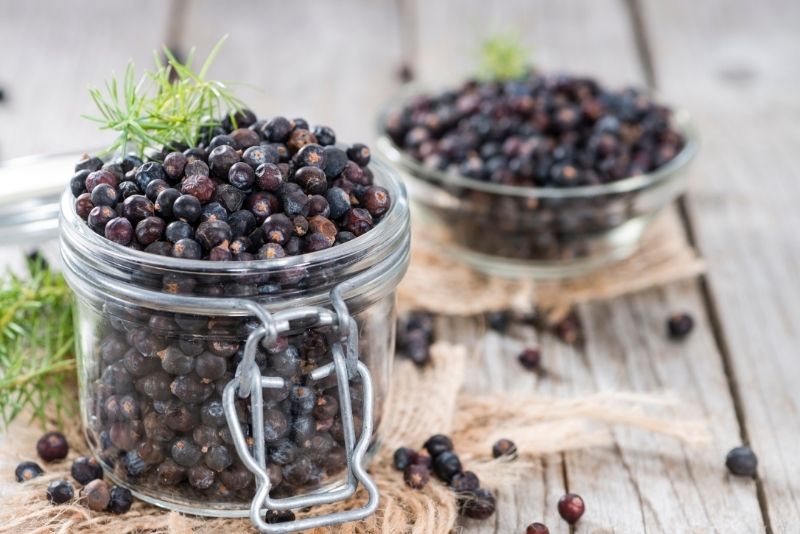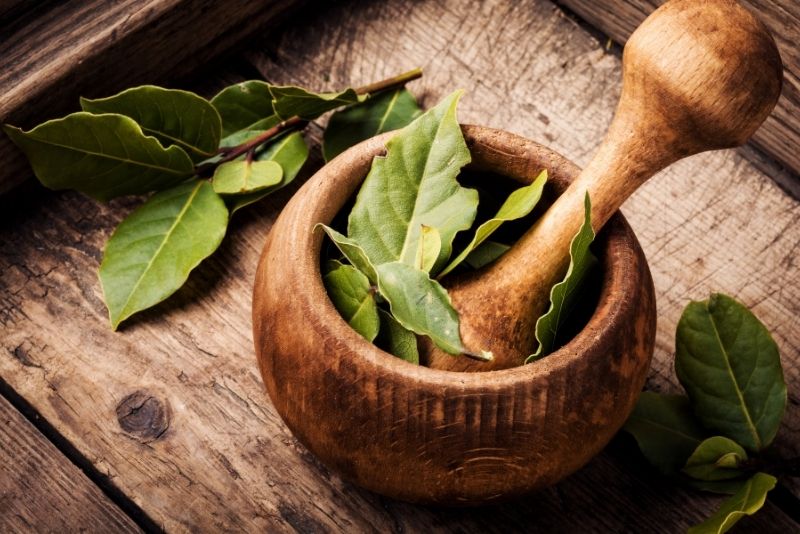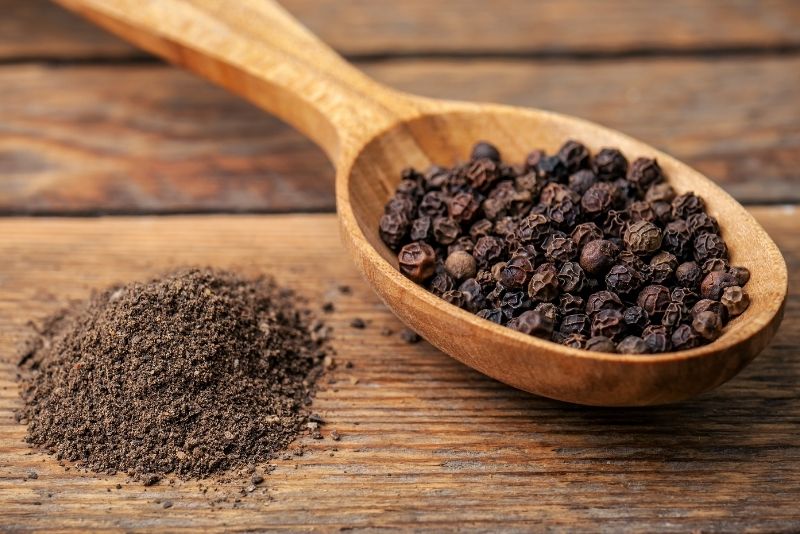One ingredient that may have come up in your holiday menu planning is Juniper Berries, but are they really necessary? Turns out, yes, they are.
Juniper berries are a key ingredient in many dishes and cocktails. They are often steeped in gin or whiskey to make those drinks more flavorful.
They’re also common enough to find on the spice rack of most kitchens due to their versatile flavor profile which pairs well with meats like pork or chicken, vegetables like carrots and potatoes, and dishes such as meatballs or risotto.
But, sometimes, you might not have it available on hand which calls for a substitution. To help you in such situations, I’ve compiled a list of 7 Juniper Berries substitutes.
The best substitutes for Juniper berries you can use are gin, rosemary, cardamon, caraway seeds, bay leaves, hickory spice, or black pepper.
These handy ingredients can easily replace juniper berries in most cases so you don’t have to go out and buy any more than you need this season.
Table of Contents
- What Are Juniper Berries?
- 7 Best Juniper Berries Substitutes
- What Does Juniper Berries Taste Like?
- Is Juniper Berries and Blueberries the Same?
- How Can You Tell if a Juniper Berry Is Edible?
- How Long Will Dried Juniper Berries Last?
- How Do You Clean Juniper Berries?
- How Do You Dry Juniper Berries?
- Final Words
What Are Juniper Berries?

Juniper berries come from the juniper plant and they are small dark blueberries. These berries typically grow in clusters or as individual berries on evergreen trees or shrubs.
In fact, juniper berries are not actual berries but cones. Juniper berries have a very woodsy, piney flavor profile with resinous undertones. This is what makes them stand out among many other spices and flavors.
They are most often associated with gin and whiskey infusions. Juniper berries can be crushed into gin for a more intense flavor or steeped as a tea for a milder version.
Now that you know a little about the juniper berries, let’s dive into the Top 7 Best Substitutes for Juniper Berries.
7 Best Juniper Berries Substitutes
1. Gin
Add a little extra kick to your food and beverages with this juniper berry substitute. Gin is a type of flavored vodka or grain alcohol that has added flavoring such as orange, mint, anise, and yes, juniper berries!
There is no specific alcohol content for the type of gin. For the substitution, replace a tablespoon of juniper berries with a teaspoon of gin. You may add a few herbs or spices to boost the aroma.
2. Rosemary
Rosemary is a fragrant, woodsy herb that has pine-like undertones and can add a new depth of flavor to your meals. The best part about using rosemary as a juniper berry substitute is that it pairs well with the same foods you would use juniper berries in.
Process: Crush one tablespoon of rosemary and mix with one tablespoon of olive oil. Rub the mixture over pork, chicken, or vegetables for a great addition to your winter menu.
Use at least 2-3 sprigs of rosemary to substitute 1 teaspoon of juniper berries.
3. Caraway Seeds
Caraway seeds or often called meridian fennel seeds and are often used in rye bread, sauerkraut, and cheeses. The taste of caraway seeds is similar to that of juniper berries with a subtle additional flavor profile that includes lemon, cumin, and dill.
Juniper berries pair well with potatoes and other root vegetables. Caraway seeds have a sweet and nutty taste and can also be used as a substitute for juniper berries in these milder dishes.
Use 1 teaspoon of caraway seeds as a substitute for 2 juniper berries in meat and vegetable dishes.
4. Cardamom
Cardamon is the seed pod of an Asian plant related to ginger. The pod houses seeds which are often dried and used for their intense flavor.
Cardamom is an aromatic spice that has hints of citrus and pine flavors as well as other floral undertones such as mint and cloves.
Even though it is a great spice to add to your kitchen shelf, it is not as common in the average American household, but it makes a good substitute for juniper berries.
You can use one teaspoon of cardamom to substitute for 1 teaspoon of juniper berries.
5. Bay Leaves

Bay leaves are the dried leaf of bay laurel trees or shrubs. They are a very common herb used in cooking all around the world. It has a distinct, strong flavor that is usually associated with tomato sauce.
The bay leaf is one of the most common substitutes for juniper berries and can be used in its place at a 1:1 level in the ground form.
Juniper berries have a strong flavor so you only need to use one or two at most per dish. Bay leaves are much milder so you can add more to your dish.
6. Hickory Spice
Another great substitution for juniper berries is hickory seasoning. Hickory seasoning is a dry rub spice mixture that can be found at your local supermarket near the BBQ sauces.
It’s a blend of many spices, yet it does have a small amount of kosher salt with ground juniper berries being one of its main ingredients.
Hickory spice is a blend of a hickory nut, allspice, and white pepper. This savory blend would be a great substitute for juniper berries because it has a slightly smoky flavor profile.
Use 1.5 teaspoons of the hickory spice to substitute for a teaspoon of juniper berry.
You don’t have to use any special equipment or techniques when cooking with this recipe for juniper berry substitutes. Just sprinkle the rub all over your meat and vegetables, let it sit for an hour or so to absorb the flavors.
7. Black Pepper

Black Pepper is a very common and well-known spice in the world that can be found anywhere from your kitchen shelf to restaurant kitchens around the world.
The flavors of black pepper are similar to that of juniper berries because they both have slight citrus and pine undertones which is why they make a great substitute.
Black pepper is already ground up, so you can easily replace your juniper berries with it quickly and easily. It still has that peppery kick you expect with dishes, but it’s milder than juniper berries.
The substitution is quite easy as well. Just follow the 1:1 ratio.
What Does Juniper Berries Taste Like?
Juniper berries have a very woodsy, piney flavor profile with resinous undertones. This is what makes them stand out among many other spices and flavors.
They are most often associated with gin and whiskey infusions. Juniper berries can be crushed into gin for a more intense flavor or steeped as a tea for a milder version.
Is Juniper Berries and Blueberries the Same?
Blueberries and juniper berries are not the same. Blueberries are sweet while juniper berries have a very piney flavor profile.
Juniper berry can be used in place of blueberries in dishes that call for them, but it will change the flavor slightly to something more bitter with fruity qualities.
How Can You Tell if a Juniper Berry Is Edible?
If you want to check if a juniper berry is edible, just crush it between your fingers. If the berry has blue-black oil, then it’s usually safe to use in cooking. If there are no oils, chances are that the juniper berry is not good for eating.
How Long Will Dried Juniper Berries Last?
Dried juniper berries will last for 4 months in an airtight container. If you want to keep them longer, put them in the freezer and they’ll be good for up to a year.
How Do You Clean Juniper Berries?
When you use the juniper berries, rinse them to clean off any dirt or grit, but do not worry about removing the berries’ skin.
How Do You Dry Juniper Berries?
Drying your own juniper berries is simple. If you want to dry the berry yourself, just leave them out on a paper towel for a couple of days and they should be dry.
Final Words
Now that you know the 7 best Juniper Berry substitutes, head to your spice cabinet and start cooking with the most preferred alternative.
I hope this article also helped you learn more about the juniper berry. If there are any questions, don’t hesitate to ask. Have a wonderful day and happy cooking.